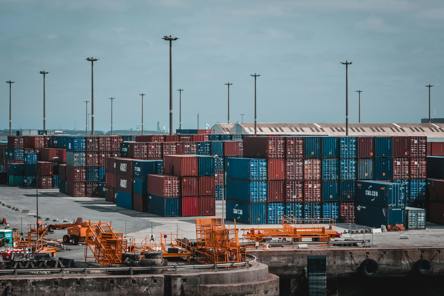The world of logistics is ever-changing, with businesses under constant pressure to deliver faster, smarter, and more cost-effectively.
And it’s as a result of increasingly complex supply chains that many organisations are turning to fourth-party logistics (4PL) providers to take full control of their logistics strategy. Indeed, the 4PL market in Europe is forecast to grow by USD 5.82 billion between 2023 and 2028.
Here, SEKO Logistics’ experts will get to the bottom of this growing popularity by explaining the key benefits of 4PLs for businesses of all types. From reducing costs to improving scalability and customer satisfaction, we’ll show you why working with a 4PL like SEKO could be the competitive edge your business needs.
Let’s first start by exploring what is meant by ‘4PL logistics’.
What is 4PL Logistics?
Fourth-party logistics, or 4PL, is a supply chain management model where a business outsources the entire logistics process to a single external provider.
A provider within this space will serve a business primarily as a strategic partner, and oversee a network of 3PLs, technologies and other resources on behalf of them. Within this, they may control inventory, transportation, reverse logistics and more.
Many 4PLs are ‘asset-light’, meaning they don’t own trucks or warehouses, and instead focus solely on supply chain oversight. SEKO takes a different approach.
As an asset-based 4PL, we combine strategic supply chain management with the physical infrastructure of our own global warehouse network. This model brings greater accountability, control, and clarity to our clients, while still delivering the flexibility and reach expected from a 4PL partner.
Explore more information on this topic with our complete guide to 4PL.
What is the Difference Between a 3PL and 4PL?
The key difference between 3PLs and 4PLs is in their respective levels of involvement within the logistics process. While 3PLs focus on the execution of specific logistics services, such as warehousing or order fulfilment, 4PLs take a step further by providing end-to-end supply chain management.
As mentioned, they will act as a single point of contact and look to optimise decision-making via technology and data-led approaches. In this way, 4PLs take a more strategic and long-term view.
Want a deeper dive into the differences? Check out our full guide on 3PL vs 4PL logistics.
What are the Benefits of Using 4PLs?
There are a multitude of potential advantages of using 4PLs for businesses of all kinds. Here are just a few:
1. Full oversight
You may think of 4PLs as acting like the central ‘control tower’ for your logistics management.
Unlike many 4PLs that operate in an ‘agnostic’ way, SEKO typically leverages our global network of facilities, people, and technology. This non-agnostic model ensures consistency and control, as businesses know exactly who is managing their goods at every stage, without relying on disconnected third-party providers.
2. Analytical insights
Because of their ability to view the whole picture, 4PLs can use data-driven tools to identify inefficiencies and forecast demand for products or services. This analytical edge may help to ensure a continuous optimisation of your logistics strategy.
The value of these insights has become especially clear in recent years. Global bottlenecks, such as the COVID-19 pandemic to the Suez Canal blockage and now the ongoing tariff wars, have highlighted the need for proactive supply chain management.
By harnessing analytical intelligence, SEKO’s 4PL model helps businesses navigate disruption, and in the process turn potential difficulties into opportunities for differentiation and resilience.
3. Improved scalability and flexibility
The ability to pivot and move with the times is more vital than ever in today’s fast-evolving marketplaces. Businesses using 4PLs may find it easier to scale operations up or down by coordinating resources and suppliers, all without the need for additional in-house investment.
With SEKO, this goes a step further. Our global network helps businesses expand into new markets with confidence, utilising tried-and-tested methodologies to implement operations seamlessly. This combination of scalability and proven market entry support ensures businesses can grow sustainably while maintaining high performance standards.
4. More satisfied customers
4PLs can help to streamline your logistics processes and, in turn, reduce delays in your goods reaching their destination. What does this mean for you? More happy customers that want to spend their money on a repeated basis.
5. Cost efficiency
Minimised delays and more efficient processes aren’t just good for customers. 4PLs can help reduce your overall logistics spend while maximising value, giving you better value for money.
6. Better risk management
Identifying and allaying risks that could affect your supply chain is one of the fundamental tasks your logistics setup should tackle. 4PLs can help businesses prepare for and mitigate challenges by building resilience with contingency planning and proactive monitoring.
7. Integration of new technologies
Most 4PLs deploy advanced platforms that unify multiple systems, giving you a single source of truth for your logistics data. Not only will this integration help to improve accuracy, but it may also help to improve collaboration across the range of partners you work with.
8. Global reach
Many 4PL providers have established international networks, which will make it easier for businesses to expand into new markets. For instance, providers like SEKO have a global network of over 150+ offices across the world, all with state-of-the-art infrastructure for your business to benefit from.
9. Access to varied expertise
A 4PL brings with it specialist industry knowledge and experience across a wide range of logistics scenarios. This expertise will support innovation and ensure your supply chain can adapt to new challenges.
For example, customs processes are becoming increasingly complex. With SEKO’s global network of compliance, backed by local expertise, businesses can ensure conformity with regulations while also managing duty and tax spend more effectively. This blend of global reach and local insight helps minimise risk, control costs, and keep goods moving smoothly across borders.
10. Stronger supplier relationships
By acting as the main point of contact for your logistics ecosystem, 4PLs help strengthen and streamline relationships with carriers and other providers.
Disadvantages of 4PLs
While there are many benefits to employing the use of a 4PL provider, taking this step will not always be the right fit for some businesses. The following are some potential downsides that are worth considering when it comes to organising your logistics set-up.
Higher costs
4PLs may charge a premium for their end-to-end oversight and new technologies. This may make it more difficult for you to justify paying out for one.
Complex Implementation
Integrating a 4PL into your existing systems can take time and resources. Not only that, but it will require alignment across multiple stakeholders.
Reduced direct control
Handing full responsibility to a 4PL means you may have less influence over day-to-day operations and vendor choices.
Not always suitable for smaller businesses
For companies with simpler logistics needs, the added layer of management might be unnecessary and overly complex.
In these cases, integrating a 3PL provider may be the better choice for your business. These typically offer a balance of cost-effectiveness and control without the added complexity of a 4PL partnership.
How to Choose the Right 4PL Provider For Your Business
Not sure which type of 4PL provider will best suit your needs? Think about the following points when making your decision to prevent any issues from occurring down the line:
-
Business complexity - Ensure the 4PL can handle the scale and intricacy of your supply chain.
-
Desired level of control - Decide how much operational oversight you want to retain versus delegate.
-
Scalability - Look for a partner that can grow with your business and adapt to new markets.
-
Technology integration - Choose a 4PL with advanced dashboards, predictive analytics, and unified systems.
-
Cost vs value - Evaluate fees alongside potential savings and strategic benefits.
-
Geographic coverage - Confirm the 4PL can coordinate across the regions where you operate.
-
Industry expertise - Prefer partners with knowledge of your sector for smoother compliance and operations.
SEKO Logistics: A 4PL Logistics Provider You Can Trust
Choosing the right logistics partner is a big decision and with SEKO, you don’t have to do it alone. As a trusted 4PL provider, we combine global reach, multi-channel distribution centres, and cutting-edge technology to give your business the competitive edge it needs.
Our services include:
Ready to take your supply chain to the next level? Get in touch with SEKO’s logistics experts today and discover how we can help streamline your operations.



